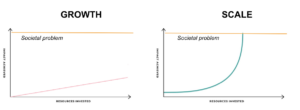Scale Readiness Diagnostic
Assess your scale readiness and address areas for improvement
Why moving towards a scale mindset can make you go further to achieve your mission.
At Spring Impact, in our decade of helping mission-driven teams on their journey to achieve impact at scale, a common misconception we see is that scale often gets mixed up or conflated with growth. Understanding the difference between scale and growth can help organisations better prioritise their resources and put impact front and centre.
1. Growing our organisation and solution might not lead to impact.
Our default way of thinking is often to focus on growth and growth alone, either growing our organisation or the reach of our solution. If you’re trying to have more impact, this feels intuitive. Why wouldn’t we want to focus on increasing the number of people our service supports? Your solution and organisation are undeniably important. But the problem you are addressing is more important still — and liable to change as the context shifts.
When we understand our scaling goal as growth alone, we tend to prioritise working on the wrong things. Maybe jumping on funding opportunities even if they’re not strategically aligned or prioritising approaches that will quickly reach many people but not achieve impact.
By adjusting our focus from growth to impact, we are more likely to be adaptable to our environment and make decisions that better meet the needs of those experiencing the problems we’re trying to tackle.
2. Focusing on growth often emphasises vanity metrics.
Vanity metrics are things we can measure to demonstrate growth but are not real indicators of impact, such as the number of staff, partners or service users reached. These are the metrics that funders are often asking us for as evidence of success, and so become our primary focus.
However, these are not meaningful indicators of whether you’re scaling the impact of your services. Better metrics will tell you about the impact of your solution in relation to the problem you’re trying to tackle. For example, the number of people who reach the intended outcomes after accessing your service or the return on investment per staff member in terms of impact. This data demonstrates more clearly the scalability of your solution and its potential to make a genuine dent in the problem.
3. Growing doesn’t always use resources strategically.
The other key difference between growth and scale is concerning resources. We know that any expansion of impact will take at least some increase in capital or human resources to get there. Growing typically involves adding resources at the same rate as adding impact, leading to a linear increase. Scaling differs in that it tends to add resources at an incremental rate to achieve an exponential increase in impact. In other words, reaching further with less.
Scaling your impact might require an increase in resources, but there might be other ways you can prioritise them to meet the size of the problem. For instance, you could fundraise to increase your team and deliver your solution to a new location, or you could train an existing organisation in this location to deliver your solution for you. By adopting a scaling mindset, you will start to think differently about your organisation and how it can best use its resources.

Get your organisation scale ready
If more organisations focused on scale, not growth, we believe our sector would be much better equipped to tackle the societal and environmental problems we face.
At Spring Impact, our training and consultancy services equip ambitious teams with the skills, tools and mindsets needed for scaling. If your organisation wants to take the next step, explore our latest available training opportunities below, including: